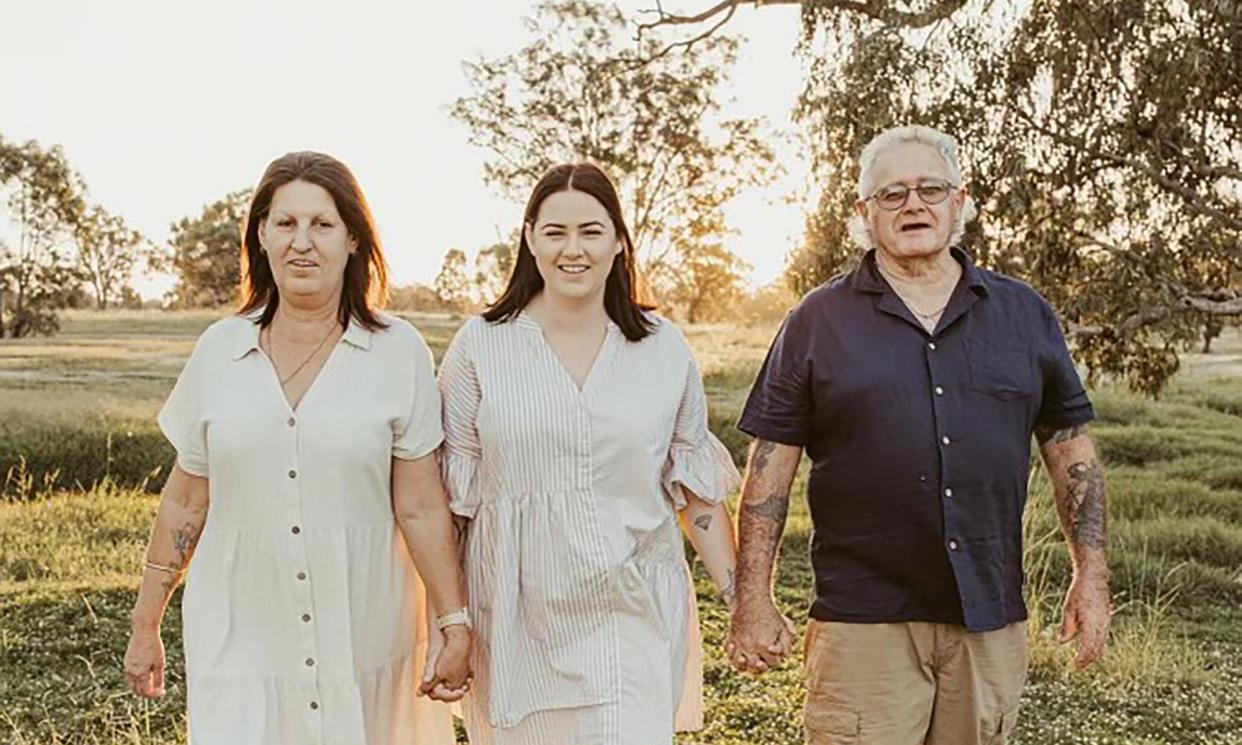Molly Ticehurst was promised state help to ‘intruder-proof’ her home. Two weeks later she was dead

Molly Ticehurst was promised help to “intruder-proof” her Forbes home as part of a state government domestic violence program two weeks before her former partner allegedly murdered her, with her grieving parents now accusing the scheme of offering her “false hope”.
Ticehurst’s parents, Tony and Kate, say their 28-year-old daughter was let down by the system and the people who promised to install lights, cameras and tough window screens at her home after she reported her ex-boyfriend Daniel Billings to police.
Her parents are calling for a review of New South Wales’ Staying Home Leaving Violence (SHLV) scheme and for funding to be cut to the local service provider, Housing Plus, that Ticehurst believed was going to help her.
“If they had done something, she could have been still here,” Kate said.
Tony said the government and the provider had “failed” his daughter.
“They just sucked the guts straight out of her,” he said.
“She was all happy that they were going to help her and then nothing … False hope they gave her.”
He was “still shattered” a month and a half on from his daughter’s death which sparked renewed calls for greater action to stop domestic violence across the country.
“I relive that Monday every day, several times,” he said.
Molly reported alleged abuse to police on 5 May. Her former partner was then charged with violent offences against her, including rape and intimidation, issued with an apprehended violence order and then bailed by a court registrar.
Molly had been fearful of going to police but was reassured repeatedly that she would be helped, her parents say.
She told her parents she had been contacted by a caseworker from Housing Plus, a not-for-profit company that provides housing and domestic violence services across NSW, on 8 April and then again on 12 April with assurances of an impending security upgrade.
Tony said his daughter told him they promised to install barriers on her windows, automatic lights and surveillance cameras.
Fourteen days after the first call and with nothing installed to make her safer, Molly was found dead in her home after a welfare check. Billings was charged with her murder and is awaiting trial.
Her mother, Kate, said it was “just wrong of them” to make her daughter feel like help was on the way.
“If they promise to help you and don’t help you, it’s neglect,” she said.
“They should have had it done that week.”
Tony recalls Molly was worried about going to the police but was less fearful at home alone once she was told that safety measures would be installed.
“We talked about it and I asked if she was happy and she said ‘yeah I am. I’ve already had people ring me up and say they can help me. They can intruder-proof my house’,” Tony recalls of a conversation he had with Molly in early May.
SHLV was established in 2006 and subsequently extended before being expanded statewide in the past month. The program was designed to enable victim survivors to stay in their homes after reporting violence by improving security.
Service providers, like Housing Plus, complete risk assessments and safety management planning, with “security upgrades for high-risk clients prioritised and delivered as soon as suitable contractors are available”, according to the government.
The Department of Communities and Justice does not impose strict timeframes for the installation of security hardware and instead, providers are in charge of overseeing those processes.
On 6 May, the NSW government announced a $230m emergency package to tackle domestic violence after Molly’s death including money to expand the SHLV program statewide.
Prevention of domestic violence minister, Jodie Harrison, was asked by Orange MP, Phil Donato, if the expanded rollout of the scheme would include “an urgent time frame within which [security] upgrades to properties must be completed”.
In response, Harrison told the house the program saw “services leverage their relationships with providers to be able to install security upgrades urgently, meanwhile keeping women safe in refuges or other temporary accommodation until those upgrades can happen”.
Harrison said the program had been “evaluated in 2022 as being successful in achieving housing stability and enhanced wellbeing for women and children affected by domestic and family violence.”
Harrison on Wednesday said the government was working to improve support.
“The death of Molly Ticehurst was a tragedy, perhaps most devastatingly so because, it should have been preventable,” she said.
A Housing Plus spokesperson said: “We are currently conducting an investigation into the interactions of Ms Ticehurst with our services.”
The Ticerhurts want urgent action to ensure no one else has to suffer.
“Everyone should know about this,” Tony said.
• In Australia, the crisis support service Lifeline is on 13 11 14 and the national family violence counselling service is on 1800 737 732. In the UK, Samaritans can be contacted on freephone 116 123 and the domestic abuse helpline is 0808 2000 247. In the US, the suicide prevention lifeline is 988 and the domestic violence hotline is 1-800-799-SAFE (7233). Other international helplines can be found via www.befrienders.org

 Yahoo News
Yahoo News 
